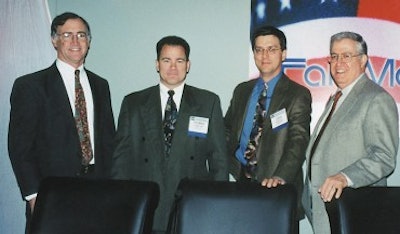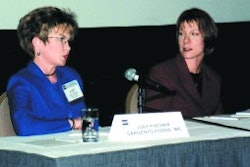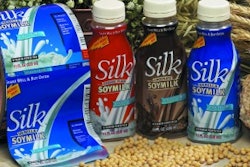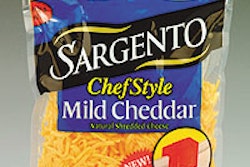
Company consolidation, turnkey packaging lines, and equipment standardization were three of the topics put to a panel of packaging equipment buyers from large companies during the fall meeting of the Packaging Machinery Manufacturers Institute (Arlington, VA) in San Mateo, CA.
The consolidation trend among manufacturers can take its toll on packaging operations. So said Tom Osip, director of packaging development for ConAgra Foods, Irvine, CA.
"We're in the midst of an integration with International Home Foods," Osip told attendees at the PMMI meeting. "Management expected it to take six months, but that's proven to be a dramatic underestimation. The capital approved for new lines was in excess of $100 million, and it was sorted out quickly. Now, we're trying to allocate where it goes, which lines need to be upgraded, which plants we're going to consolidate, and which products need to shift from one facility to another. It's a huge drain on our staff."
Dave Snyder, director of technical purchasing at Nestle USA, Glendale, CA, has had similar experiences. "In anticipation of an acquisition, things do get put on hold," he said. At Nestle, the consolidation of manufacturing usually results in small change, not the building of new plants "because the company probably has overcapacity once the two companies are combined. But there is certainly a lot of individual line-modification updates, trying to absorb capacity from other underutilized plants," he added.
Although consolidation isn't much of an issue at E. & J. Gallo Winery, Modesto, CA, director of plant engineering John Kalal explained how projects can be streamlined. "As margins go down, our decision-making process lengthens," he said. "Anything that's going to enhance sales will make decision making very streamlined. If there's a governmental need or a demonstrated savings, we can make those decisions on purchasing very rapidly."
He cited a shift to laser coding of wine bottles exported to Europe. To be in compliance with European regulations, the codes have to be 95% human-readable, he reported. "The decision to go to laser coding took about two weeks to get approval. Although it represents only about $2 million in spending, the decisions can be made quickly," Kalal said, tongue in cheek.
Turnkey lines, yes or no?
At Gallo and ConAgra, turnkey lines are a fact of life, if not always a successful fact. But Nestle's Snyder says his company prefers to do the engineering in-house.
"If we ask a single supplier to guarantee the performance of a turnkey line, it puts its company at risk," Synder told the machinery makers. "Quite often, your companies are much smaller than ours, so the loss could be devastating. So we more or less try to integrate the equipment in-house."
Prior to a change in Gallo management, Kalal reports that the winery put in a turnkey line that wasn't successful. "We hadn't done all our homework up front, making sure the companies knew technically what they were selling to us. Lack of standardization was an issue, and the real problems we had were in ongoing maintenance costs, spare parts inventory, and the uniqueness of some machines.
Since Gallo doesn't have a large engineering staff, turnkey projects are still important to the company, Kalal explained. "They can work fantastically, so long as the expectations have been laid out in detail and everyone understands the packaging material specifications up front."
ConAgra's Osip also reported a tough experience when the company employed an integrator for a new line. "Even though this experience was painful, we still feel this is the way to go," Osip said. "Long-term, I'm very bullish about turnkey projects."
Standardization efforts
Several of these large manufacturers have embarked on a program to standardize equipment purchases, they told the PMMI audience.
"We're driving toward a lot of standardization in our equipment," Gallo's Kalal stated. "And we're asking OEMs to comply with our standards. In some cases, it's been painful. We've run into companies that are hesitant, often requesting charges for this standardization that go beyond what we think is fair." Not only is Gallo requesting standardized control packages, but it's scrutinizing the technical capabilities of its suppliers and the individuals who will be supporting equipment long-term.
At Nestle USA, Snyder reports an aggressive program of adopting standardized equipment. "We're working with our 32 plants in Nestle USA, as well as with Alcon and Perrier, to try to find where we have commonality to group our applications," Snyder said. "We're trying to focus a bit more, rather than continuing to buy one of everything."
However, Snyder also predicts more global consolidation of manufacturing for Nestle. "As trade barriers are removed in Asia and Latin America, and eventually in Europe as well, we'll have a phenomenal consolidation of our manufacturing. Because of these barriers, we have some rather underutilized plants in many countries that are just manufacturing for domestic consumption."
ConAgra's Osip was more guarded. "In the last five years, we've spent a lot on packaging equipment," he said. "And we're still in the midst of some of that integration. Going forward, there's a lot more scrutiny of return on assets. If something is revolutionary in terms of payback, money's always available. But spending is definitely tighter."


























